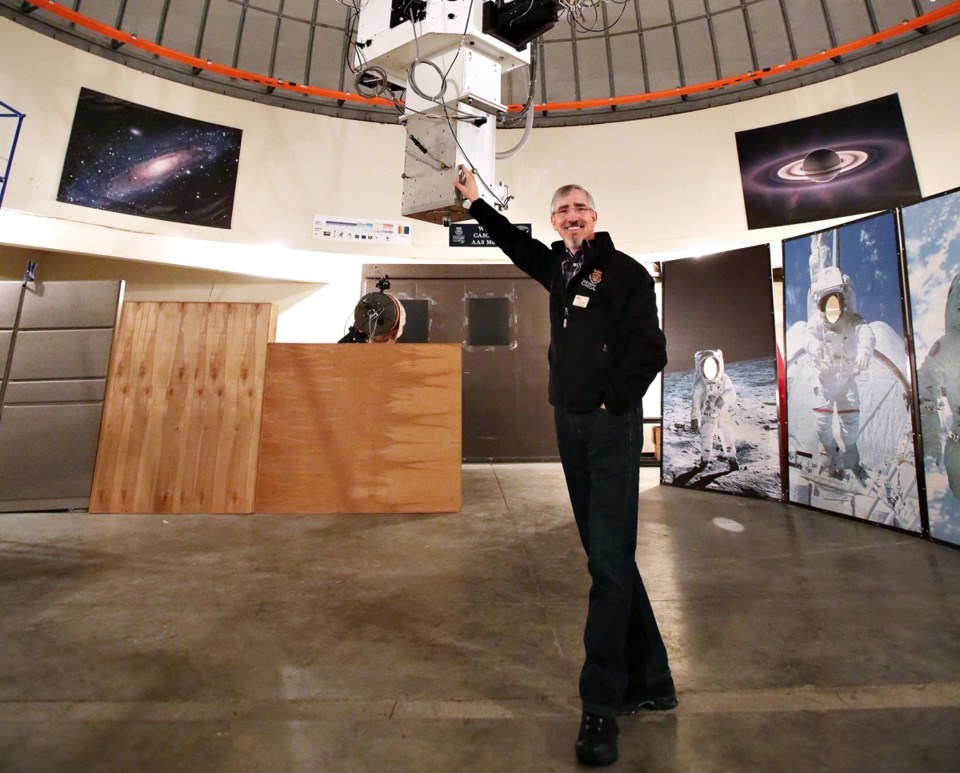A Foothills observatory is working to keep the rural Alberta sky dark.
The Rothney Astrophysical Observatory, near Priddis, is committed to raising awareness on light pollution and its harmful effects.
"[Foothills residents] live in a very, very, very special part of the world," said Dr. Phil Langill, director of the observatory. "And that is a part of the world where it gets dark at night, where people can go outside and with their eyes look up at the stars and gaze upon the universe with their eyes and enjoy the pleasure of that."
As a lifelong Calgarian, Langill said people outside of the big city might take the sky's natural nighttime beauty for granted.
"People who live in the country think that the dark, story-filled sky will always be there," he said. "When I drive home at the end of the night, the stars start disappearing. As soon as I get into the city, they're gone.
"So I get a daily reminder of how lucky people who live around the observatory are that they have this beautiful site, so what we do at the observatory is we remind people that they have this beautiful opportunity and if they're not careful, they're going to lose it."
DarkSky International, which works to raise awareness on light pollution and conserve dark skies worldwide, defines light pollution as "the human-made alteration of outdoor light levels from those occurring naturally."
The observatory serves as southern Alberta's representative for the international organization, which recognizes "dark sky places" that have preserved the natural beauty of their skies.
Beyond the sky's beauty and rural aesthetic, the University of Calgary astrophysicist added that light pollution poses serious problems for the natural world.
"Light pollution is impacting the ability of plants and animals and bugs and bats and birds to survive," Langill said. "Because when you change their environment, maybe that's stresses them out, their ability to find food is changed.
"It becomes a very stressful environment and so we also have to strive to keep the natural world healthy by keeping it naturally dark at night."
Langill has spent many years raising awareness on the issue with Foothills residents and encouraging people to monitor their nighttime light usage.
He is also committed to highlighting the importance of the issue with the City of Calgary and the Government of Alberta.
"These are the people that design and build big lighting systems," he said. "And they have no idea the impact that lights have on the natural world, so we are trying our best to get that message out to not just people but the big entities as well."
This year, Langill and the Rothney Astrophysical Observatory have been recognized for their outreach work with an Emerald Award for Environmental Excellence nomination from the Alberta Emerald Foundation.
"It's the only program in Canada to recognize environmental excellence across a range of sectors," said Sabrina Huot, the foundation's communications and engagement specialist.
Thirty-three nominees from across 15 Alberta municipalities are up for the awards, with the observatory being nominated in the "Public Engagement & Outreach" category.
"We do a million things at the observatory," said Langill. "As it pertains to the Emerald Award ... our efforts to educate people around light pollution and try to put together some initiatives that are designed to help people understand light pollution and think about it a little bit more in the hopes that they can take take on the concern themselves and do things that will protect the nighttime sky."
Langill hopes to continue letting Foothills residents know about the observatory's work, and is happy to invite people to see for themselves.
"It must be a little odd, I think, for people who live around the observatory to look up on the hill and see this big facility and wonder, 'What the heck is going on up there on the hill?'"
He added that people have been "afraid to turn in to see what was going on because they were interrupting some top secret work, or those crazy university astronomers?
"We have to do a better job of letting people know what we do with the observatory, cause there's nothing top secret going on. It's all fun science."
The 33rd annual Emerald Awards ceremony will be held on June 6 at the Calgary Central Library.




